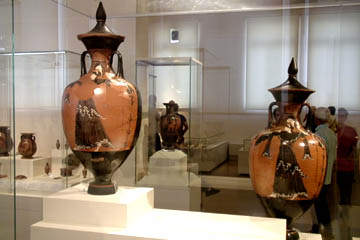A Greasy Proposition
Everyone knows about the Olympic Games, held every four years in the Greek town of Olympia, where athletes competed for the prize of an olive wreath. What most people don't realise is that the Olympics were not the only games in Greece, nor even the most important. Delphi held the Pythian Games and gave winners a wreath of laurel. Isthmia - a city which gave its name to the geographical feature "isthmus" - held its games every two years and winners received a wreath of pine needles. Even less attractive (to my mind) were the Nemean Games, also held every two years, where winners were crowned with a wreath of wild celery!
These four contests were known as the Panhellenic Games and obviously prestige was the main thing on offer, because the games held in other cities were far more financially rewarding. The Panathenaic Games, for example, were held every four years in Athens. The festival started on the 21st of the month Hekatombaion and ended seven days later when a grand procession started at the Dipylon Gate (now to be seen in the grounds of the Kerameikos Museum) and ended up on the Acropolis with a sacrifice to Athena. The purpose of the procession was to give the goddess a new dress and the garment, a peplos, was hoisted like a sail on a wheeled ship and hauled up the hill to the Parthenon. How they got it up the stairs onto the Acropolis, I don't know!
During the week there were a succession of games: there were athletic events, which were open to any Greek citizen; there were events which tested skill and coordination, and these were only open to citizens of Athens. These "games" were well worth winning, as the winner was presented with one or more amphorae of olive oil from the sacred groves of Athens. The special amphorae, each of which held a talent of oil (75 lbs), showed the goddess in the guise of Athena Promachos (fully armed) on one side, along with the words "From the prizes of Athens" and the name of the archon or presiding ruler. The other side depicted the particular event for which the prize had been awarded.

|
| Panathenaic amphorae in the National Archaeological Museum in Athens. |
Now 75lb of best quality olive oil may not set your heart-strings a-quiver, but in a society where olive oil was used for everything from lighting to cooking to anointing the body, it was a worthwhile commodity and when you realise that in some contests the winner might receive as many as 140 amphorae, you can see that it was a paying proposition to try and win one of the events in the Panathenaic.
Yet despite the financial reward, the games in Athens have been all but forgotten and it is the Olympic Games and their prize of olive leaves(!) which carried all the kudos and attracted the best athletes from all over the Greco-Roman world, but it is the Olympics which are still remembered. When there was a modern movement to recreate a set of international games, it was the Olympics, not the Panatheaic, which provided the model.
It reminds me of a time and motion expert who was invited to study an abattoir and was appalled to discover a group of men who worked in an underground cellar, with blood, urine and faeces dripping through the ceiling, hot, uncomfortable and generally the sort of conditions that should have a trades unionist slavering to call a strike. As a matter of urgency the expert urged management to improve the lot of these unfortunate workers - and was so urgent that management actually stirred themselves and acted. The underground room was closed and the men given better conditions and even a slight increase in pay to make up for the discomfort they had experienced.
The result? Within weeks half the men had quit and the other half were so dissatisfied that they were threatening strike action!
A new expert was called in to assess the situation and by talking to the men and reading between the lines discovered that the awful conditions had resulted in a tight bonding of the group: they were the tough ones, the men who could cope with anything management could throw at them. They walked with a swagger and looked down on workers in more comfortable, less demanding jobs.
Once the conditions had been ameliorated, they no longer had anything to bind them together or to give them cause to value themselves so highly. They had become part of the "softie" class they had affected to despise and the resulting dissatisfaction had manifested itself in resignations and strikes.
Truly, as the old Yorkshire proverb has it, "There's nowt so queer as folks!"
© Kendall K. Down 2009





